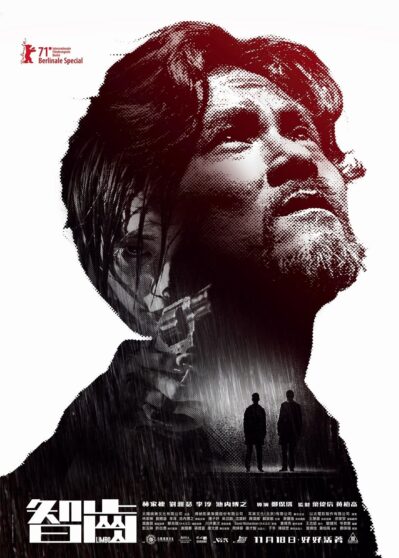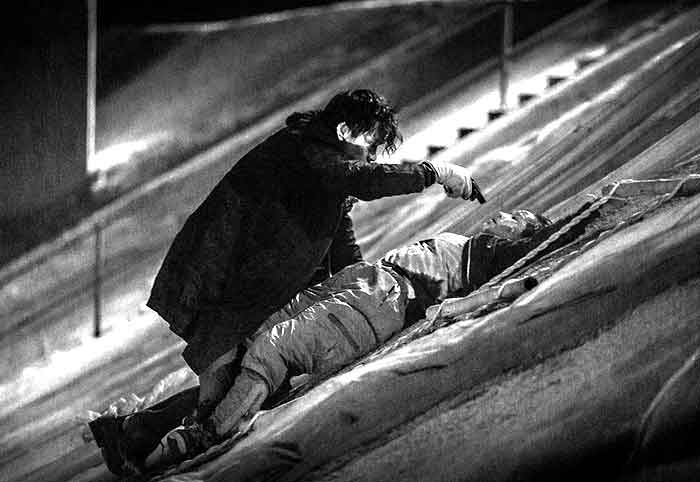 A prime example of new school Hong Kong genre filmmaking, with a more sober and noirish take on material that was formerly rendered in the delirious high-energy format perfected by Tsui Hark and John Woo. This isn’t an especially promising development, as there’s a reason modern HK cinema has failed to recapture the popularity of the Hong Kong martial arts films of the 1970s, and also the shoot-‘em-ups of the 80s and 90s.
A prime example of new school Hong Kong genre filmmaking, with a more sober and noirish take on material that was formerly rendered in the delirious high-energy format perfected by Tsui Hark and John Woo. This isn’t an especially promising development, as there’s a reason modern HK cinema has failed to recapture the popularity of the Hong Kong martial arts films of the 1970s, and also the shoot-‘em-ups of the 80s and 90s.
LIMBO (2021) is an above-average example of the new Hong Kong filmmaking aesthetic. Directed by Soi Cheang (DOG BITE DOG, KILL ZONE 2) and scripted by Kin-Yee Au (PTU, MAD DETECTIVE), two of the new HK cinema’s guiding lights, it’s a profoundly gritty, brooding and downbeat serial killer thriller lensed in luminous black and white. The prestige overlay appears to have worked to the film’s advantage, as it scored multiple nominations at the Hong Kong Film Awards, and nabbed the Best Film prize from the Hong Kong Film Critics Society.
…a profoundly gritty, brooding and downbeat serial killer thriller lensed in luminous black and white.
The narrative isn’t exactly novel, with the veteran cop Cham Lau (Ka-Tung Lam) teaming up with the straight-laced rookie Will Ren (Mason Lee) to track down a ghetto-dwelling serial killer (Hiroyuki Ikeuchi). This freak preys on women, leaving their body parts strewn around various slums.
Soi Cheang and cinematographer Siu-Keung Cheng drench LIMBO in stately and magisterial widescreen visuals.
As any veteran cop movie watcher well knows, Cham has a tendency toward unpredictable violence, while Will favors a more by-the-book-approach. Cham’s issues stem, flashbacks inform us, from a hit and run accident that took the life of his daughter and left his wife comatose, with the culprit being a young woman named Wong To. She’s just been released from prison, but Cham feels her sentence was too lenient.
In an effort at atonement Wong rats out her criminal accomplices to Cham, and helps with the murder investigation. She and the guys learn that the killer they’re searching for is a nut with an amputee fetish who targets damaged and/or deformed young women—with his latest victim being Wong. Matters aren’t helped by the fact that Will loses his pistol and the killer nabs it, rendering an already dangerous investigation even more so.
Soi Cheang and cinematographer Siu-Keung Cheng drench LIMBO in stately and magisterial widescreen visuals. The film looks uniformly gorgeous, which conflicts somewhat with the mud, rain and overall squalor of the scenery (with garbage-strewn alleys being common locations). It seems Cheang was trying to outdo BLADE RUNNER and SEVEN in dystopian grime, and he very nearly succeeds.
Nor does Cheang skimp on the kinetic action sequences so integral to Hong Kong cinema. Much of that action, superbly choreographed though it is (as expected in a Hong Kong production), feels gratuitous, such as an elaborate four minute chase that occurs around the 19 minute mark, and brings the proceedings dangerously close to peaking early.
The acting honors go to Ka-Tung Lam, who’s appropriately intense as Cham Lau, and also Yase Liu (credited as “Liu Cya”) as Wong To, in one of the most overtly physical performances of any recent film. She gets knocked around mightily, yet holds her own in the many fight scenes in which she appears, being thoroughly convincing as both perpetrator and victim. It helps, of course, that Lam and Liu are each given sufficient screen time, something that can’t be said for Mason Lee (Ang Lee’s son) as Cham’s partner or Hiroyuki Ikeuchi as the killer, both of whose roles are woefully underdeveloped.
So yes, this film has problems, and no, it won’t lift Hong Cinema out of its post-millennial malaise. It does, however, prove a highly diverting jolt of refined nastiness.
Vital Statistics
LIMBO
Sun Entertainment Culture/Bona Film Group/Er Dong Culture
Director: Soi Cheang
Producers: Paco Wong, Wilson Yip
Screenplay: Kin-Yee Au
(Based on a novel by Lei Mi)
Cinematography: Siu-Keung Cheng
Editing: David Richardson
Cast: “Gordon Lam” (Ka-Tung Lam), “Liu Cya” (Yase Liu), Mason Lee, Hiroyuki Ikeuchi, Shovon Ahmed, Sujon Ahmed, Hanna Chan, Rakibul Islam, Fish Liew, Omar Faruk Nayon, Abed Sarker, Kumer So, Sammy Sun, Adeed Zaan

